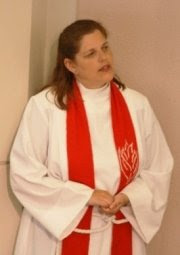From now through December we will be reading the 4 books that tell the story of the life and ministry of Jesus.
Matthew, Mark, Luke & John are the four books, the Gospels in the Bible that tell the life of Jesus.
The Gospels were not written during the life of Jesus. They were written between about 60 and 100 AD or between 30 and 70 years after Jesus had died.
Immediately after Jesus' death, Christians believed that Jesus was coming again very soon and so they focused on spreading the message of Christ. It was only when the first generation of Christians began to die that it became important to have the stories of the life of Jesus written down.
When the debates were happening about which books should be considered Scripture for Christians between 350 and 500 AD there were about a dozen "Gospels" under consideration. These four were chosen.
Each of the four Gospels was written for a different audience and with a different purpose:
Mark is the basic telling of the teachings of Jesus - designed for a broad audience to communicate the basics.
Matthew was written for the community of Jewish believers and focuses on showing Jesus as the promised Messiah and the fulfiller of the law.
Luke was written for the community of gentile believers and as a particular emphasis on the way that Jesus' teaching promoted justice and equality for the marginalized
John was written for a community of people who already knew the basic stories of Jesus and is as much a book of theology as it is the story of the life of Jesus.
A couple of things to notice as you read:
There is a story of the birth of Jesus only in Matthew & Luke and the two stories are different
Notice the differences in the Easter stories in the four Gospels
Notice that some of the stories only appear in one or two of the Gospels
Look at the story of the Sermon on the Mount in Matthew & Luke and how they are different.
Here is the schedule of readings for this part of the challenge
October 29 – November 4 – Matthew
Day 1 – Chapters 1-2 Day 2 –
Chapters 3-4
Day 3 – Chapters 5-6 Day 4 –
Chapters 7-8
Day 5 – Chapters 9-10 Day 6 –
Chapters 11-12
November 5 – 11 – Matthew
Day 1 – Chapters 13-14 Day
2 – Chapters 15-16
Day 3 – Chapters 17-18 Day
4 – Chapters 19-20
Day 5- Chapters 21-24 Day 5 –
Chapters 25-28
November 12 – 18 – Mark
Day 1 – Chapters 1-2 Day 2 –
Chapters 3-4
Day 3 – Chapters 5-6 Day 4 –
Chapters 7-8
Day 5 – Chapters 9-10 Day 6 –
Chapters 11-12
November 19 – 25 – Mark & Luke
Day 1 – Chapters 13-14
Day 2 – Chapters 15-16
Begin Luke
Day 3 – Chapters 1-2 Day 4 –
Chapters 3-4
Day 5 – Chapters 5-6 Day 6 – Chapters
7-8
November 26-December 1 – Luke
Day 1 – Chapters 9-12 Day 2 –
Chapters 13-15
Day 3 – Chapters 16-18 Day
4- Chapters 19-21
Day 5 – Chapters 22-24
December 2 – 8 – John
Day 1- Chapters 1-2 Day 2 –
Chapters 3-4
Day 3 – Chapters 5-6 Day 4 –
Chapters 7-8
Day 5 – Chapters 9-10 Day 6 –
Chapters 11-12
December 9 – 15 – John
Day 1 – Chapters 13-14 Day
2 – Chapters 15-16
Day 3 – Chapters 17-18 Day
4 – Chapters 19-21
